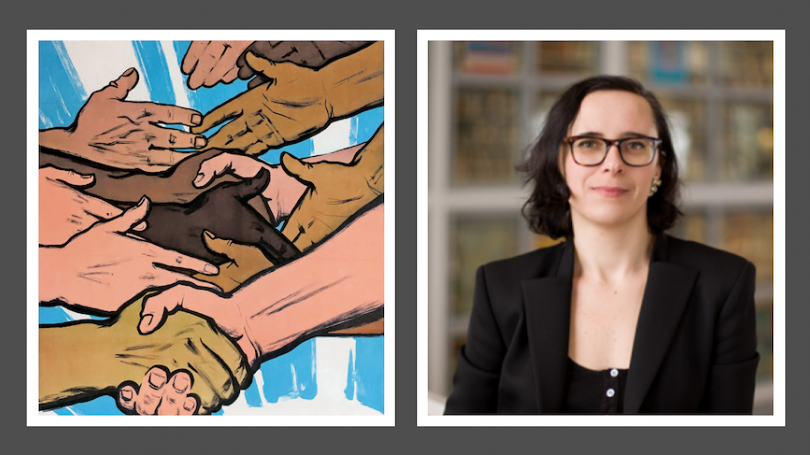
- Undergraduate
- Graduate
- News & Events
- People
Back to Top Nav
Back to Top Nav
Back to Top Nav

LANGUAGE
PALM READING
Yuliya Komska on the handshake
YES, WORDS MATTER. In the physical world, they can be our headlamps in the tunnel of the Anthropocene, our stepping-stones in the quagmire of politics. Think of the neologisms—tierratrauma, solastalgia, nausirage—that philosophers Glenn Albrecht and Ginny Battson have coined for today's human condition. Or of the dictionaries that have guided the #resistance. Or of how awareness of dog whistles and racist tropes has made it easier to call out right-wingers.
But what if words have come to matter too much, the almost exclusive fixation on them stunting our understanding of language in its fullest sense? In the digital world, "natural" language processing, which involves training AI to extract the meaning and function of words from their context, replicates many of the old racist and sexist biases. Online search and optimization engines, Ngrams, and speech corpora push big-data analyses toward writing and away from oral or nonverbal communication.
The verbal tide has swallowed many poignant reminders that language extends far beyond semantics. Brilliant explorations of the rise of emoji, the sexism of voice policing (remember vocal fry?), the stutters of politicians, and the role of laughter and interruption in parliamentary debates have all stood in the shadow of "words, words, words," to echo Hamlet.
Covid-19 has begun to change that. Remote work has awoken some to the importance of speech protocols and conversational turn taking, while others have begun to worry about losing their voices to silence. Even earlier, hygienic concerns were already highlighting marginalized categories such as gesture, alerting us to the bigger picture of what language is. Cue the handshake, ç In the ninth century BCE, Assyrian stonemasons carved a handshake scene onto an ornate throne dais to suggest a meeting of equals (or a more complex confirmation of power, as the site's director of excavations suggested). Four centuries later, ancient Greeks depicted dexiosis, or the taking of the right hand, on funerary sculpture, possibly to signify a farewell. Seventeenth-century Dutch painters put merchant hand squeezes front and center to advertise their ostensibly republican unpretentiousness. In the twentieth century, multiracial grips hovered, disembodied, on posters promoting internationalism.
Real-life handshakes became inflated news-cycle currency. Some might recall the long-awaited conciliatory clinch between Palestinian Liberation Organization chairman Yasser Arafat and Israeli prime minister Yitzhak Rabin on September 13, 1993. A Reuters photographer needed four different cameras to capture this emblem of hope (which today remains unfulfilled).
In recent years, however, the handshake has shifted from a practice symbolizing equality to one designating the very opposite. In several Western European countries, schools and courts have gone so far as to elevate the formality to an indispensable national ritual. The handshake, the argument goes, is a marker of "civilization" and, for immigrants, assimilation. Denmark is a prime example. In December 2018, under pressure from the right-wing Danish People's Party, a law enshrined the handshake as part of the naturalization ceremony—an obvious if indirect means to discriminate against those Muslims who follow madhabs that might prohibit such bodily contact between men and women (although, notably, such proscriptions are hardly limited to Islam). On similar grounds, individual citizenship denials and educational discrimination have occurred in France, the Netherlands, and Switzerland. (The Swiss rejected a proposal for blanket Denmark-style regulation.)
As Covid-19 spread across Europe this March, Denmark was the first country to suspend all naturalizations: "No Handshakes, No New Citizens," read the New York Times headline. In an instant, the right-wing dream of white Christian domination had come a step closer to realization. A small gesture, the measure made obvious, could have quick and significant consequences under unpredictable circumstances. While we remain transfixed by words—say, by martial rhetoric or racist contagion metaphors—other such gestures, big and small, may be slipping through the cracks, ignored or dismissed, at potentially devastating cost.
But the pandemic has also exposed just how politically dispensable the handshake is. Before the lockdowns, at press conferences and high-level meetings, leaders practiced the so-called Ebola shake (an elbow bump) or Wuhan shake (a double foot bump) or, like Angela Merkel, cracked a smile instead. The soaring popularity of namaste raises questions about cultural appropriation yet has also been welcomed by some Indian commentators. The political future of the discriminatory handshake could be as easy to suspend as the handshake itself—and for perpetuity.
Its attrition could make room for an inspired nonverbal multilingualism, built on multilateral negotiation of and openness to a wide variety of signs from across cultures—a safeguard against codifying and valorizing exclusionary tokens of so-called civilization. Such a multilingualism would be a revival more than an invention. Consider historian Céline Carayon's research on nonverbal communication in early colonial settings. It uncovers the richness, sophistication, and diversity of gestures among speakers of Native languages and, in turn, French colonists' receptiveness to them as verbal proxies. Given the difficulty of recording and later interpreting "kinetic" signs, the transmutations of languages over time, the subsequent oppression of Native peoples, and the partial linguicide caused by forced assimilation, we cannot always know what these signs once meant. But it is certain that, well before speech, they made possible zones of contact, regulated barriers to mutual intelligibility, and blurred the lines between alphabetic, embodied, and alternative modes of communication—not only for the worse, Carayon notes, but also for the better. Gesture, such histories emphasize, is more than a form of gatekeeping.
Yuliya Komska is an associate professor of German studies at Dartmouth College and a coauthor (with Michelle Moyd and David Gramling) of Linguistic Disobedience: Restoring Power to Civic Language (Palgrave Macmillan, 2019).